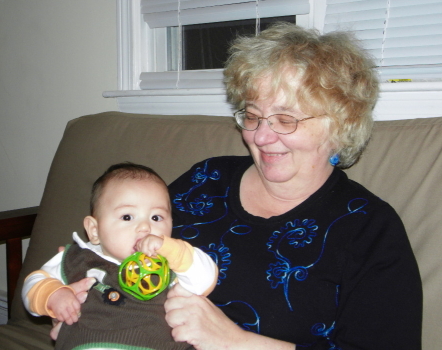How Early Can You Teach Math to Kids?
 Many people ask me when is a good time to teach kids math. In my experience, it can never be too early. You just need to keep some order. Multiplication should be taught after addition, and negative numbers after subtraction. Kids should remember multiplication by heart at the age of seven. They can understand negative numbers as early as four.
Many people ask me when is a good time to teach kids math. In my experience, it can never be too early. You just need to keep some order. Multiplication should be taught after addition, and negative numbers after subtraction. Kids should remember multiplication by heart at the age of seven. They can understand negative numbers as early as four.
In the picture I am explaining Platonic solids to four-month-old Eli, the son of my friends. His homework is to chew on a dodecahedron.
It's Elementary:
First off, I’ve been following your blog for the past couple months and enjoy your witty humor and math wisdom. I wanted to reply to this post because I have had success with my four year old daughter ever since she was one years old. Every book I read I would call off the page numbers and then the total # of pages at the end of the book, every time we drove I would put the mph display up on the console so that she could watch the numbers go up and down (subtraction and negative numbers), and of course had her coutnt he number of licks it took to get to the center of her lolly pop. I would agree that it is never too early to start being creative in how you show the math. I have been amazed at how many concepts she knows at the age of four, all without direct teaching. Great pic by the way!! Thanks for sharing and keep up the great writing.
4 December 2010, 11:37 pmFelipe Pait:
Platonic solids have always been a favorite! It seems kids don’t get enough of them these days. By the way, kids who can add and subtract enjoy Euler’s formula about faces, vertices, and edges, even when their teachers don’t know it.
6 December 2010, 7:37 amRandom:
The big issue I think is not *when* do you start, but rather *how*?
A lot of math intangibles can be absorbed very early on by children if they are fortunate enough to be surrounded by people who are mathematical and talk about it (not even necessarily specifically to them).
On the other hand, anything done in the classroom is a lot dicier. I recommend this article:
https://www.psychologytoday.com/blog/freedom-learn/201003/when-less-is-more-the-case-teaching-less-math-in-schools
It pretty much matches my own experience: I learned a lot of math from my parents, but I hated the few times we sat down and did math in a school-like setting.
15 December 2010, 9:58 amThe Cube:
I think one of the missing ingredients for kids to learn math is not about arithmetic and algebra, and pure memorization will only get them to a certain point. When they reach a higher level math, they will probably struggle even more because they don’t know what math really is.
What they should learn is how to do proofs. When I look at the board each time and watch my teacher write all the proofs, I have no idea what he’s doing and how he came up with the math rigor, and all I know is how it works and not why it works.
So I think most student are missing the point in not learning how to do proof, and it should be taught earlier in the kid’s life.
20 December 2010, 9:16 pm